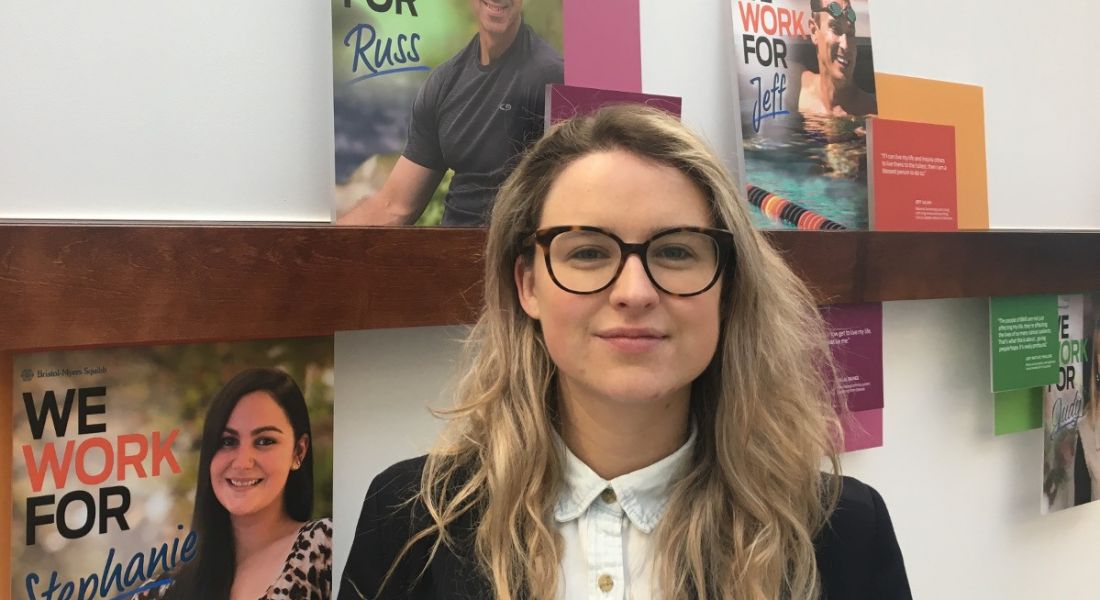Want to know what it’s like working as an engineer within the biopharma sector?
It’s Engineers Week and, to celebrate, we’re taking a closer look at those who work in the vast field of engineering.
While one might have a certain perception of what an engineer does, what you might picture is probably only the tip of the iceberg. Engineering spans across countless industries and includes anything from mechanical engineering to software engineering.
Engineers are needed in virtually every sector, including the fast-growing world of biopharma. But what is it like working as an engineer within the biopharma industry?
Andrea Doherty is an upstream manufacturing support engineer at the Bristol-Myers Squibb (BMS) Cruiserath biologics facility. She told us how she arrived in her current role, and shared some sage advice for anyone thinking of pursuing a similar career.
What first stirred your interest in a career in this engineering field?
In my final year of chemical and bioprocess engineering in UCD, I received the research project to ‘test the cell-cycle inhibitor methotrexate on cycle development and productivity’.
This meant the biologics lab was my home for the following three months; culturing cells, infecting cells with different inhibitor concentrations and analysing protein productivity, with a month left for a results-comparison study.
This project, along with the bioprocess modules, gave me a fundamental understanding of the cellular make-up and the different protein characterisations achievable by manipulating the cell environment.
My study gave me an insight into how the productivity of life-saving manipulated proteins can be increased, and being involved at a large, commercial scale stirred my interest in the biopharma industry.
I realised by the development of research, design and new technologies, I could be involved in bringing life-changing treatments to millions of people, both in Ireland and around the world.
In addition, the biopharma industry was (and still is) a relatively young industry when I began my career in biopharma, so I understood being involved in the start-ups would provide incredibly exciting career opportunities for bioprocess engineers.
What education and jobs led you to the role you now have?
Graduating in chemical and bioprocess engineering in UCD has given me an excellent foundation. This degree, accredited to master’s level by the Institution of Chemical Engineers, recognises the growing importance of the biopharmaceutical sector in Ireland, as well as API pharma, oil and gas, and many more industries.
This degree provides you with the fundamentals to be technically, environmentally and socially able to tackle any role, across research and development, science and technology, automation/process/manufacturing/design engineering, supply chain, and scheduling.
Beginning my career as an undergraduate and graduate process engineer in oil and gas gave me a great understanding of complex processes and automation systems through troubleshooting wide variations in temperature, pressure and flow rate to meet the economic demands of the energy sector.
Also, being an engineer in this highly complex industry with fluctuating margins has given me the speed, process optimisation skills and drive to achieve the maximum output in all projects that I encounter.
Then, being introduced into the biopharma industry through process engineering roles in biopharma companies, I gained experience in project start-ups, quality regulations and industry standards as well as increasing my knowledge in unit operations and automation systems.
What were the biggest challenges you encountered on your career path?
One of the biggest challenges I encountered starting out in my career was providing my opinion in meetings, as I found the complexity of industry and the knowledge of experienced staff quite daunting.
Also, I like to brainstorm or think through issues fully before answering questions or providing opinion, and I didn’t feel comfortable doing so without being 100pc sure on the possible outcomes. Sometimes, I then came out of meetings without my voice being heard, and feeling a little frustrated that I had not provided my input.
To tackle this, I decided to do more pre-work before meetings to prepare my thoughts – this made me more comfortable and gave me the encouragement to speak out. I also learned that I could assure colleagues that I will think the subject through and come back to them with an answer within a certain timeline.
I felt this approach helped me and I learned that the more participation you have in meetings, the better understanding you get and learn how to benefit from them.
Was there any one person who was particularly influential as your career developed?
I attended a two-week professional refinery engineering programme in Houston, Texas, as a graduate engineer in oil and gas, and I always remember a piece of advice that a member of the leadership team gave us.
This advice was simply along the lines of: all you need to do is work as hard as you can in the role you are in now and, when you have mastered it, a pathway will always open. This also reflects one of Oprah Winfrey’s quotes: “Doing the best at this moment puts you in the best place for the next moment.”
What do you enjoy about your job?
Working in a billion-dollar project with the outcome of supplying new medicines to patients with life-threatening cancer diseases gives me great job satisfaction. I have been lucky to get the role of manufacturing support engineer for the inoculation area and therefore have been directly involved in the introduction of the first cells into the manufacturing facility at Cruiserath.
Scheduling, optimising and monitoring their growth from a frozen 2ml vial to a 15,000l bioreactor is quite exciting. This takes hard work in a fast-paced environment, and interaction with multidisciplinary teams – including automation, quality, manufacturing science and technology, manufacturing technology, supply chain, process engineering etc – on a daily basis.
Biopharmaceuticals has such an exciting future in research and treatment of its patients. The pipeline for the potential technology transfer of new drugs is never-ending, which means continuous growth and learning for us as a team at BMS.
What aspects of your personality do you feel make you suited to this job?
As a support engineer for a particular area of manufacturing, I like to be accountable. This means understanding what is required to ensure our targets are met in a compliant manner.
I enjoy working with people, which makes interacting with such a large multidisciplinary team a lot easier.
I also enjoy a challenge, which is an attribute that is required in a start-up of this scale, and I do try to hit the ground running and come up with solutions and improvements in a timely manner.
I am also passionate about my job and am willing to be flexible to get the job done.
How did BMS support you on your career path?
BMS has given me room to be innovative and experimental in my approach to tasks. They have provided me with a safe environment to make decisions and be supported, which is reflected by the healthy ‘no blame’ culture.
My managers have given me guidance on a regular basis and I have often escalated issues without hesitation. I have received praise and constructive criticism to improve and grow in my day-to-day role.
BMS as a company actively works to make the lives of its employees easier and more exciting through company benefits and support networks, sports and social, diversity and inclusion, and so on, which I believe all adds to the employee satisfaction and career development.
What advice would you give to those considering a career in this area?
If you are considering a career in this area, then I’d say definitely go for it. The culture, job opportunities and prospects of working with the newest, most innovative technologies and products are of the highest standard in biopharma.
There is quite an exciting future, with advances being prominent across all the biological sciences, increasing the variety of biotech products through clinical trials.
For anybody starting out, I would advise to be confident, believe in yourself, learn as much as you can, do not be afraid to ask for help or explanations, work hard, laugh and enjoy it!




